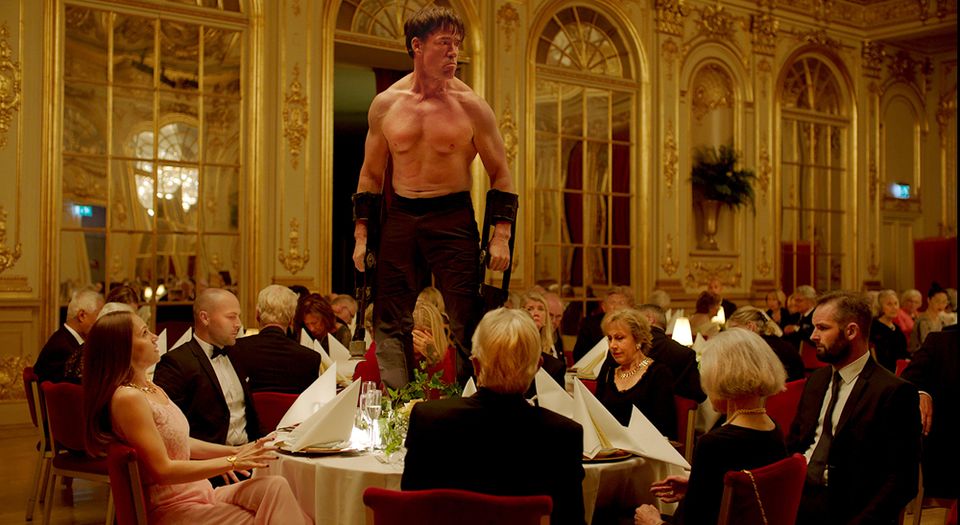The Square: a vicious satire on the new elite
Ruben Ostlund’s film brilliantly pricks the pretensions of Europe’s cultural set.

Want to read spiked ad-free? Become a spiked supporter.
Ruben Ostlund’s darkly funny Palme d’Or-winner, The Square, has been heralded by most critics as a stinging satire on the contemporary art world. In fact, what makes it so unique is its merciless critique of the cultural elite more broadly. It satirises the sensibilities and pretensions of a class that has come to dominate politics, culture and the media across the West.
Christian (Claes Bang) is a curator for a contemporary art gallery in Stockholm and is the archetypal member of the cultural set. He is part of a new elite that has come to replace the aristocracy of old. As a class, they are mostly unproductive #8211; a great deal of Christian’s and his colleagues’ work time is spent doing personal errands or attending social gatherings. In his words, he is a ‘semi-public figure’.
Few actually attend Christian’s gallery, however. A running joke sees members of the public tentatively enter one exhibit only to leave immediately. In the opening scenes, Christian struggles to articulate both the meaning of the gallery’s artistic jargon and the public benefit of its exhibits. The gallery – and the creative class’s lifestyles – are funded almost entirely by public money.
Called the X-Royal, Christian’s gallery is a former palace, and so this new elite’s indulgent exhibits, bizarre performance-art pieces and raves take place in what were once the bedrooms of Swedish kings and queens. An old statue of a nobleman on horseback outside the palace has to be torn down to make room for ‘The Square’, the centrepiece of a new exhibit.
It is an illuminated patch of pavement outside the gallery, with a plaque that reads ‘The Square: a sanctuary of trust and caring. Within it we all share equal rights and obligations.’ This artwork-cum-safe-space is supposed to symbolise the professed egalitarianism and tolerance of the cultural elite. In reality, it seems to represent the opposite. An advertising agency commissioned to promote the exhibit produces a viral video, featuring a homeless orphan girl sleeping in ‘The Square’ and being blown to pieces.
Beneath a veneer of virtue-signalling, the characters are self-regarding and filled with contempt for the rest of the public. Those outside of their class are only ever experienced as a nuisance, usually as beggars or criminals.
When Christian’s pockets are picked in a confidence trick, he tracks down his phone to a council block and hatches a plan to retrieve it. He drives across town in his electric car, which he calls the ‘Tesla of Justice’, and distributes threatening letters to every apartment, accusing all the residents indiscriminately of being thieves. The letters end up making one boy’s life hell.
At one point, Christian has a one-night stand with an American journalist, Anne (Elisabeth Moss). Afterwards, she offers to throw away his used condom. He refuses, point blank, to hand it over to her, leading to an excruciating tug-of-war. ‘You really think highly of yourself, don’t you’, Anne rightly concludes.
The artworld setting provides the film with many of its funniest, darkest and maddest moments, including a terrifying turn by Terry Notary as a performance artist playing an ape, who terrorises the gallery’s wealthy patrons. But the outlook of Christian and his social circle, their liberal pretensions and disdain for the masses, could be found just as easily among the elites in politics, the media, education and civil society.
In an era of ballot-box revolts against elite values, the arts have, for the most part, been reluctant to criticise their own kind. But The Square’s satire dismantles the veneer of virtue-signalling which so often disguises and downplays the real institutional power of the cultural set. Meet the new elite, same as the old elite.
Fraser Myers is a writer. Follow him on Twitter @FraserMyers
Watch the trailer for The Square:
Who funds spiked? You do
We are funded by you. And in this era of cancel culture and advertiser boycotts, we rely on your donations more than ever. Seventy per cent of our revenue comes from our readers’ donations – the vast majority giving just £5 per month. If you make a regular donation – of £5 a month or £50 a year – you can become a and enjoy:
–Ad-free reading
–Exclusive events
–Access to our comments section
It’s the best way to keep spiked going – and growing. Thank you!









Comments
Want to join the conversation?
Only spiked supporters and patrons, who donate regularly to us, can comment on our articles.